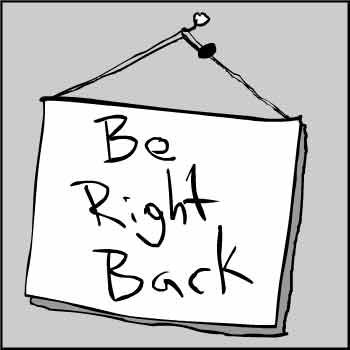Motivo: Remodelações no blog ;)
24 agosto 2007
10 agosto 2007
Slogan do ano!
"Archivists are Teachers"
Título da sessão n.º 210 da Annual meeting of the Society of American Archivists que decorreu em Setembro de 2006.
"Too often students learn to use archival collections in isolation without the assistance of archival professionals. This session focuses on ways to incorporate archivists as teachers into the education process, developing tools that show researchers how to use archives in more effective ways and encouraging information literacy. Speakers explore educational initiatives ranging from using primary sources for History Day and in NARA’s educational program to online tutorials for post-secondary students."

Arquivado por
Anónimo
0
notas de aplicação
![]()
Termos de acesso: Arquivistas, Arquivos
09 agosto 2007
É nosso dever, por um mundo melhor
Apagão Mundial

No dia 10 de Agosto de 2007, entre as 19h55 e as 20h00, propomo-nos apagar todas as luzes para dar um alívio ao planeta.
A proposta partiu de França. Se a resposta for massiva, a poupança energética pode ser brutal.
A proposta partiu de França. Se a resposta for massiva, a poupança energética pode ser brutal.
Só 5 minutos, a ver o que acontece.
Reenviem a notícia.
Não estão convencidos?
Ora reflictam sobre os dados seguintes:
- Os portugueses estão a pagar os combustíveis, a electricidade e o gás mais caros do que a média da União Europeia (UE) dos 15, quando ganham menos de metade, considera um estudo do economista Eugénio Rosa;
- Cada português gastou, em média, 12 barris de petróleo no ano passado. Um valor recorde para o consumo de energia que representa também um máximo no desperdício: o fraco crescimento não justifica aumento do consumo;
- Segundo a EWEN, o consumo específico de energia em Portugal, é um dos mais elevados da Europa. Por cada Euro do nosso PIB, gastamos cerca de 15 cêntimos de energia.
Convencidos que temos de poupar o planeta e a nossa carteira?
VAMOS A ISSO!
Mais informação:
Projecto Quercus «Ecocasa»: Poupar energia em casa
TOP TEN: Orientação do consumidor para escolha de equipamentos do dia-a-dia
Arquivado por
Anónimo
1 notas de aplicação
![]()
Termos de acesso: Ambiente
02 agosto 2007
Digital archivists look to porn
BERKELEY, Calif.--How can society preserve digital art on the Internet the way brick-and-mortar museums can for Picassos and van Goghs?
Oddly enough, at least one preservationist believes the answer might be found in an expression that most curators don't consider art--online pornography.
Oddly enough, at least one preservationist believes the answer might be found in an expression that most curators don't consider art--online pornography.
"I guarantee that a wealth of pornography from the late 20th century will survive in digital distributed form (because) it's a social model that's working extremely well," said Kurt Bollacker, digital research manager at the Long Now Foundation, a nonprofit fostering several digital-works preservation projects. Bollacker spoke Thursday at a symposium called "New Media and Social Memory" at the University of California at Berkeley Art Museum and Pacific Film Archive.
He held up the adult industry--always the digital pioneer--as one example of a self-selected community on the Web that swaps images and videos so regularly and widely that that activity will ultimately help preserve an archive over years. Similarly, he pointed to successful niche archives like the Multi-Arcade Machine Emulator, or MAME, a collective of programmers who preserved video games from the 1980s with CPU and hardware emulators.
"Anyone interested in preserving digital art should evaluate ongoing distributed data efforts," said Bollacker, who has a background in artificial intelligence and previously worked with the Internet Archive, a Web preservation project.
Bollacker was among several technologists, academics and curators considering the question of digital art and how to preserve it in a fast-moving world of technological change.
Challenges to preservationTraditionally, preserving any art--books, music or paintings--has been highly controlled by skilled professionals, who often deal with tangible, long-lasting and, in the case of museum quality art, highly expensive materials. But in the digital world, that model is turned on its ear--just ask the record labels if controlling distribution of digital music is easy. On the Internet, moving data is cheap and easy, the media is ephemeral, and preservationists are amateurs.
And as Bollacker said, "Millions of people can make digital art, and maybe most of it is crap, so we don't know which to save."
The challenges to cataloging and preserving any work online are common to all fields of art. Those include the limits of human resources to track the body of work online--and those are only getting more finite. Another is the obsolescence of file formats: how can future generations access digital media if the formats and software they're recorded in are eventually replaced?
The digital realm does have its benefits, however. Costs of storage have dropped so low that Hitachi recently unveiled the first terabyte hard drive, opening up the possibility of storing all of the text of the Library of Congress on one server, for example. Low-cost bandwidth also makes it easy for people to move media relatively easily. And the Internet is not short on creativity or motivation from the millions of people it attracts.
Still, preservationists are asking themselves how best to record history (...)."
CNET News.com
E pronto quando é para arquivar, é para arquivar MESMO TUDO!
E AGORA DIGAM LÁ QUE SER ARQUIVISTA É MAU?! EHEHEHEHE
Arquivado por
Anónimo
0
notas de aplicação
![]()
Termos de acesso: Arquivos, Digitalização, Tipologias de arquivos
Subscrever:
Comentários (Atom)

